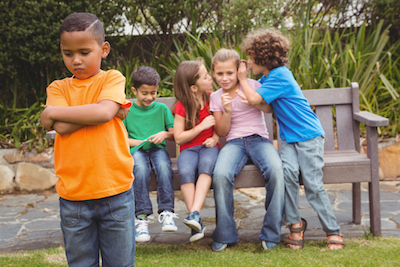How should we communicate with other parents as our kids get older?
As a parent of a big kid, one who is not quite yet a teen but close to it, my husband and I have found that we are starting to allow our child more freedom to do things. He is hanging out with other kids more at our house and their houses. He’s riding his bike to his friend’s houses alone. This means that more and more often, we are trusting other parents to keep an eye on our kid and in turn, we are watching not only our son but his friends, too.
All this kid-sharing has gotten me thinking about communication with other parents. Since these big kids are “hanging out” and planning it on their own, the days of parent-engineered play dates are all but over. Now other parents are texting with us to confirm that our kiddo made it to their place or vice versa, or that it’s time to send them home for dinner. In light of this progression towards independence and preteen socialization, how do we know what should be shared with other parents, and what can be written off as typical kid stuff?
For example, there is a birthday party. Your kid didn’t get invited, but you overhear a friend telling your kid about it. Do you say something? To anyone? Or what if a friend of your son or daughter tells you over dinner at your place that he or she is being bullied, but they don’t want anyone (not even their own family) to know? How about if you hear about someone drinking at a friend’s house? You overhear that the parents are “totally cool” with it. These types of situations can be difficult to navigate. Sometimes, the simplest ones can quickly become the most complicated.
How to know when to speak up- and when not to
As a therapist at Teen Xpress with the Howard Phillips Center for Children and Families, I tell teens that “what they say here, stays here,” unless there is a safety concern. If I am worried about their safety, or someone else’s, I am legally, ethically and morally obligated to let parents (and others) know.
I decided that this line of thinking is a good place to start when it comes to my own family and friends. That being said, some potential situations are going to require different actions. How about the first situation? Your child finds out about a party from a friend. They are going, but your kid wasn’t invited. Who do you talk to about that?
After some thought, I decided the only person I would talk to about that would be my own child. I would check in with him to see how he is feeling about things. Is he feeling sad or left out? Maybe he doesn’t even care? Unless there was outright cruelty involved, I would not plan on talking with the family throwing the party. No one is going to be asked to participate in every activity, event, or party. This can be a disappointing or hurtful moment, but a learning opportunity as well. I would talk about how this happens to kids all the time, and it can be due to many different things. Usually, there are only so many kids that can be invited to a party. If this happened and my son genuinely seemed upset or disappointed, I would try to get him together with another friend or have some sort of fun family event.
A very serious topic, bullying.
 If a friend of my child tells me they are being bullied, but doesn’t want their family to know, I would gently let them know that people do need to know what is going on because their safety could be at risk. I would offer to talk with their family with them and try to be empathetic and supportive. The chance we take by ignoring something that could cause danger for our own child or someone else’s is just too great.
If a friend of my child tells me they are being bullied, but doesn’t want their family to know, I would gently let them know that people do need to know what is going on because their safety could be at risk. I would offer to talk with their family with them and try to be empathetic and supportive. The chance we take by ignoring something that could cause danger for our own child or someone else’s is just too great.
Another potentially complicated issue is one of teen drinking.
Safety is definitely at risk when teens consume alcohol, but things can easily get tricky because different parents have different points of view on this. Some parents believe that allowing their teen to drink at home will demystify it and take the fun or excitement out of drinking; others do not allow their teen to drink at all.
In our home, we have not yet crossed that bridge, but I know that we will soon. I also know that drinking will not be allowed or condoned in our home- not for our children, or for any other children. If a teen comes to our home under the influence, their family will be notified. I hate to see kids get in trouble, but I will not stand by or cover up for a young person engaging in a dangerous behavior.
Life with big kids can be challenging.
The days of innocent play where everyone in the class gets invited to all the same parties are over. Bullying happens. Risky decisions can be made. Many parents don’t always know all the things that their preteens and teens get into, so being there to guide them every step of the way is hard. Knowing when to step in, set boundaries, and get involved is tough, and often requires a delicate balance of setting limits, trusting your gut, and doing what you said you are going to do.
Knowing when to keep one’s mouth shut and when to speak out depends on who you are as a parent and what your beliefs are. Take time to figure out who you are and what you think before the situations arise. If they haven’t started yet- they will!







